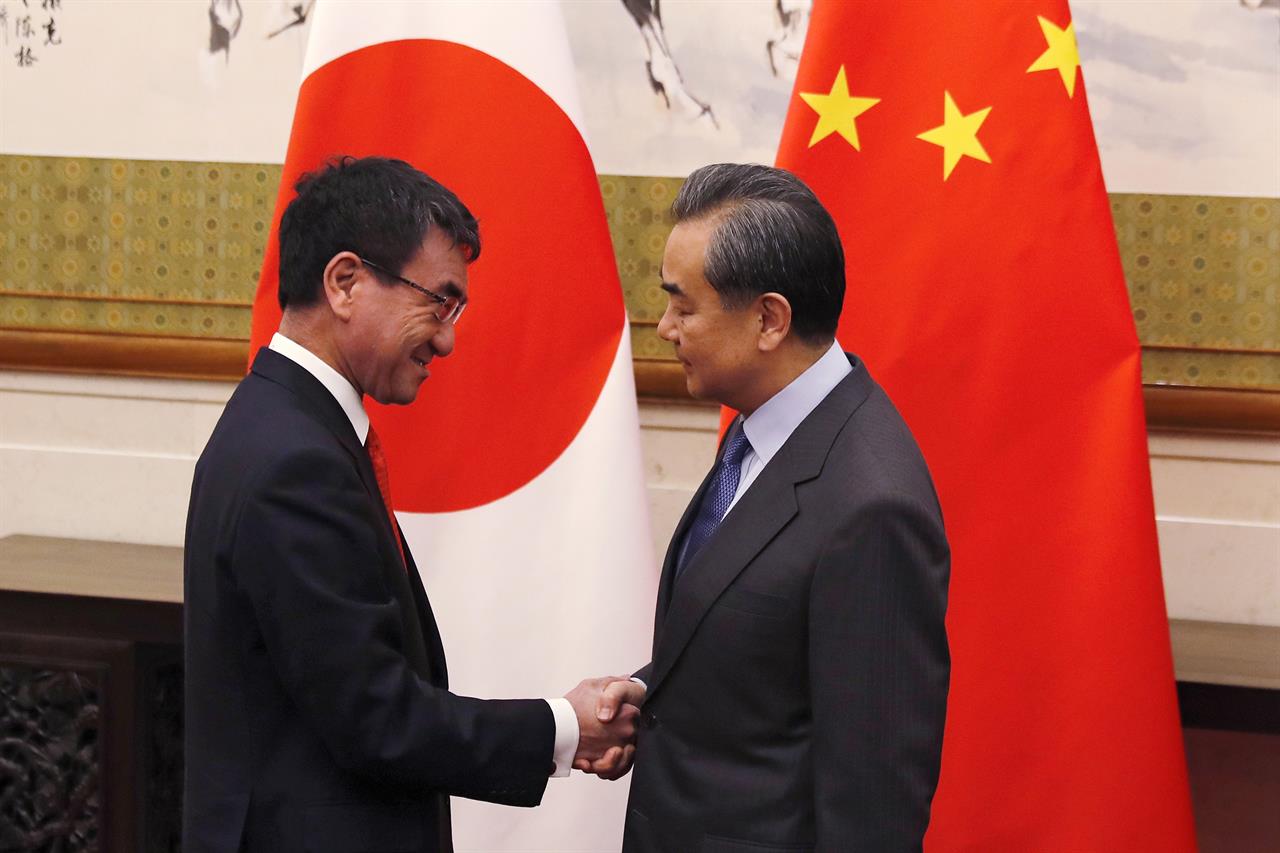China, Japan Improve Ties
April 16, 2018 | Expert Insights

Japan and China have pledged to improve economic ties and affirmed their commitment to comply with trade regulations.
Background
International relations between the People’s Republic of China and the State of Japan have been strongly influenced throughout history by China with its language, architecture, culture, religion, philosophy, and law. In the mid-19th century, China opened trade relations with the West. On the other hand, Japan began its active process of Westernization during the Meiji Restoration in 1868 adopting Western European culture. During this time, Japan started to view China as an old-fashioned civilization, incapable of shielding itself against Western influences, partly due to the First and Second Opium Wars and Anglo-French Expeditions from the 1860s to the 1880s.
The Chinese government believes that the relationship between the two nations has been strained mainly because of their wartime past. However, according to the Japanese government, the expansion of the Chinese army and its forceful actions have been damaging the relations. China-Japan relations have been considerably better under Shinzo Abe as Prime Minister of Japan since September 2006. However, in the early 2010s, the relations deteriorated, when Japan accused China of withholding its reserves of valuable rare-earth elements. The dispute at the Senkaku Islands also resulted in several aggressive encounters in the East China Sea.
The hostility between the two stemmed from the history of the Japanese war and the imperialism and maritime disputes in the East China Sea. As a result, leaders from both nations are trying to suppress the tensions considering that the two nations are close business partners. Chinese President Xi Jinping and Japanese Prime Minister Abe Shinzo have met several times to build a cordial relationship between the two countries.
Despite the ongoing tensions, China and Japan have been progressively improving their relationships by focusing on developing healthy ties and aiming at a new start. Presently, both nations are cooperating in numerous areas, including boosting global trade and economic activities. They are also working together on the One Belt One Road Initiative and setting up maritime and air contact system to enhance communication.
In terms of nominal GDP, China and Japan's economies are respectively the world's second and third-largest economies. In 2008, trade between the two nations grew to US$266.4 billion, a rise of 12.5% in 2007, making China and Japan the top two-way trading partners. In 2009, China was the biggest destination for Japanese exports.
Analysis
China and Japan held their first high-level economic talks in almost eight years following trade threats from the United States. These talks between Chinese Foreign Minister Wang Yi and his Japanese counterpart Taro Kono have not been linked to President Donald Trump’s protectionist policies. However, the meeting noted that both nations rely heavily on the American market, as well as the interdependence between the two. Additionally, the foreign ministers agreed to work closely to push North Korea to abandon its nuclear program.
Japan requested China to safeguard the fair and free transfers of technology and exchanges of intellectual property. The threats from the US on applying tariffs to about US$50 billion on Chinese imports were addressed as "unfair Chinese economic practices" in IP and forced technology transfers. Japan also made requests of China regarding steel overproduction. However, it was reported that China had asked for Japan’s help on US steel tariffs, which have been imposed on both Japan and China.
It should be noted that even prior to US President Donald Trump’s election, he had criticized both Chinese and Japanese trade and economic policy as unfair and damaging to the US. Recently, he threatened tariffs on Chinese exports and limits on investment, and just last week took a shot at Japan, saying the nation “has hit us hard on trade for years."
Most recently, China replaced the US as the number one trading partner for most nations in Asia, even those that have military alliances with the US, such as South Korea, Japan, and Australia. For the US, China is not just a trading partner, but an important source of investment and tourists, giving added bargaining and coercive power against other Asian nations.
Nevertheless, the US is currently a more important overall economic partner for Asian nations. Japan has much more money invested in the US than it does in China, and regardless of the recent tensions, many Asian companies rely on the US market.
Trade tension between the US and China is an ongoing event. Even before Trump commenced railing against the trade deficit, the US had complained to the World Trade Organization about Chinese actions more than about any other nation.
As a result, to revive Japan’s economy, the country aims at balancing tense relations with China, its biggest trading partner, who is also its military ally and guarantor of its security. The two countries agreed to improve ties by having their leaders pay mutual visits, starting with a visit next month to Japan by Chinese Premier Li Keqiang for a trilateral summit involving South Korean President Moon Jae-in.
Assessment
Our assessment is that it remains to be seen whether the relationship between China and Japan would remain stable due to their strong bilateral trades or if it could collapse due to historical rivalry and enmity. The strengthening relationship between the two nations denoted a rise of intra-Asian trade which could weaken the power of attempts made by the United States to coerce countries.








Comments